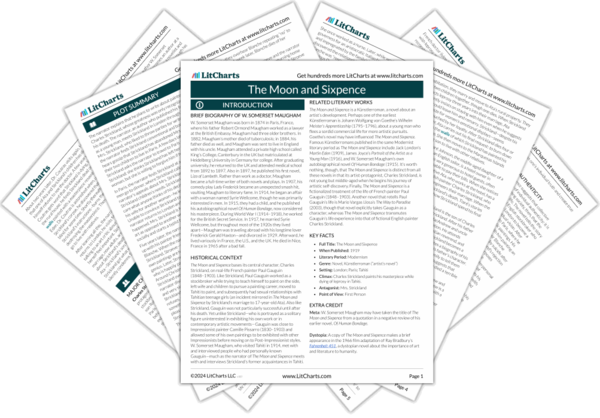The Moon and Sixpence represents morality as a form of social control: according to the novel’s unnamed narrator, morality is not individual conscience, but rather an internalization of social norms meant to protect society from individualistic behavior. Fittingly, the novel’s individualistic “hero,” Charles Strickland, is someone who casts aside morality and social norms in order to express himself. Strickland abandons his wife (Mrs. Strickland) and children in London to become a painter in Paris. From there, he conducts an affair with his friend’s wife Blanche Stroeve simply because he sexually desires her. He then expresses indifference when Blanche dies by suicide after he abandons her in turn. Later, he marries a 17-year-old Tahitian girl named Ata to take care of his sexual and domestic needs but regularly beats her. Though the novel’s unnamed narrator at various times criticizes Strickland’s selfish, callous, and immoral behavior, the narrator can never fully condemn Strickland for two reasons. First, the narrator feels that all moral judgment is inherently smug and inauthentic, so he can’t take it entirely seriously. Second, the narrator feels that morality is essentially about curbing authentic individual impulses—impulses the narrator valorizes—so he must demonize morality to some degree. By having Strickland reject morality and having the narrator valorize Strickland for that rejection, the novel suggests that morality is a form of inauthentic social control that individuals can and should cast aside.
Morality ThemeTracker

Morality Quotes in The Moon and Sixpence
It was obvious that he had no social gifts, but these a man can do without; he had no eccentricity even, to take him out of the common run; he was just a good, dull, honest, plain man. One would admire his excellent qualities, but avoid his company. He was null. He was probably a worthy member of society, a good husband and father, an honest broker; but there was no reason to waste one’s time over him.
I take it that conscience is the guardian in the individual of the rules which the community has evolved for its own preservation. It is the policeman in all our hearts, set there to watch that we do not break its laws. It is the spy seated in the central stronghold of the ego.
Their life in its own way was an idyll, and it managed to achieve a singular beauty.
It may be that in rogues the writer gratifies instincts deep-rooted in him, which the manners and customs of a civilized world have forced back to the mysterious recesses of the subconscious. In giving to the character of his invention flesh and bones he is giving life to that part of himself which finds no other means of expression. His satisfaction is a sense of liberation.
“She had a wonderful body, and I wanted to paint a nude. When I’d finished my picture I took no more interest in her.”
My Uncle Henry, for twenty-seven years Vicar of Whitstable, was on these occasions in the habit of saying that the devil could always quote scripture to his purpose.













